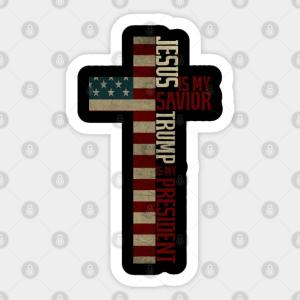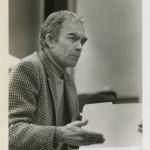Christian Nationalism as Folk Religion
One of the most influential articles I read was by sociologist of religion Robert Ellwood, who I got to know personally later. It was about Christianity’s “down-home turn.” Right now I don’t remember where it was published, but I cut out the article and kept it in my files. It spurred me to write my book Questions to All Your Answers: The Journey from Folk Religion to Examined Faith.
According to Ellwood, folk religion is basing religion on feelings without critical thinking or even cognitive content. Folk religion is ahistorical and anti-intellectual. (I went beyond the brief article by Ellwood and studied other descriptions of folk religion.) Folk religion thrives on something other than given revelation, history, reason and that “something other” can be many things including, I believe, a religious-like commitment to and passion for something finite like a nation state. The religion of Germany in the 1930s and early 1940s was the National Socialist idea of “Germania” and the Aryan Race.
Today’s American Christian Nationalism is a form of folk religion. It is clearly disconnected from history (except American history), revelation (America is nowhere found in the Bible), and critical thinking. It is a form of “group think” and smacks of cultism, especially when takes a political form such as Trumpism. And it is based on a veneration, if not worship, of America (feeling).
I have spoken with many American Christian pastors about American Nationalism and asked them why they shy away from guiding their congregants away from it. The answer is uniform: I would lose my church. But if at least some expressions of American Christian Nationalism are heretical, as I believe they are, is it worth it to try to keep a church that cannot stand to hear the truth? What to do? I sympathize with their dilemma, but worry about their silence about the subject.
Stanley Hauerwas is surely correct that Americanism has become one of the “great” (powerful, widespread, lasting) world religions. But it is one without universal appeal; it is a false gospel. It is a false religion and needs to be treated as such.
None of what I have said here implies anti-Americanism. I love America; I am an American patriot. But that does not include elevating America to the status of a god worthy of worship. Now, I know that most American Christian Nationalists do not think they are worshiping America, but all one has to do is listen to them and see how they treat those who disagree with them to discern that their passion about America as God’s instrument for saving the world borders on a blasphemous idolatry.
A problem here is, of course, that almost every American Christian Nationalist will deny that their nationalism is religious and reject any claim that it borders on idolatry or is folk religion rather than biblical-orthodox. But one has to pay attention to their rhetoric about America and their actions in placing American patriotism above even commitment to Jesus and the church. Or they mix and mingle, blend their patriotism with their commitment to Jesus and the church inappropriately. “Jesus is Lord” and “America is God’s chosen country to save the world” are placed on an equal plane and mixed together to the point that they cannot tolerate other Christians who disagree with that dual commitment.
The influencers of American evangelical-orthodox Christianity are too silent about this contemporary shape of American Christian Nationalism. I am looking to them to condemn it without qualification. They need to call out as idolatrous those churches that include in worship more than thankfulness to God for the blessings he has bestowed on America, going so far as to hold worship services that focus all attention on America to the displacement of Jesus Christ or to the demotion of Jesus Christ as co-savior with America.
I have been in American Christian church services, often on the Sunday before Independent Day (July 4) where that was clearly the case.
I visited Iowa’s largest church (then) on that Sunday. A friend was a member of the pastoral staff and I was visiting him that Sunday from out of town. The whole “worship service” was devoted to panegyrics about America including a band playing the “hymns” of each branch of the US military and having color guards carrying military banners and wearing uniforms down the aisles into the sanctuary. US flags were everywhere. People who served in various branches of the US military were invited to stand for special recognition. A US senator gave the prayer and preached. Everything was about how great America is even to the point of coming very close to worshiping America. Jesus was not the focus of attention there on that Sunday.
I had just returned from living in Germany for a year and had studied, in place, German Christianity in Germany during the 1930s and early 1940s. I was shocked by the similarity, in ethos if not in symbolic forms.
But, at least, I thought, they are not focusing religious-spiritual attention on a political figure, not even Ronald Reagan. I suspected, though, that the majority of the attenders were Reagan supporters. But that worship service and others like it then pointed the way, cleared a path, toward what is happening in many such churches and “worship” services today in America where anyone who is paying attention can discern easily that Americanism, Trumpism, and Christianity (that is not real Christianity) are being blended.
How can leading American Christian influencers stand by and remain silent about this? Am I a voice crying in the wilderness—among American evangelicals? That is how I feel.
*If you choose to comment, make sure your comment is relatively brief (no more than 100 words), on topic, addressed to me, civil and respectful (not hostile or argumentative), and devoid of pictures or links.*














